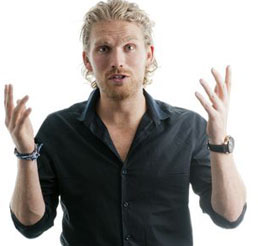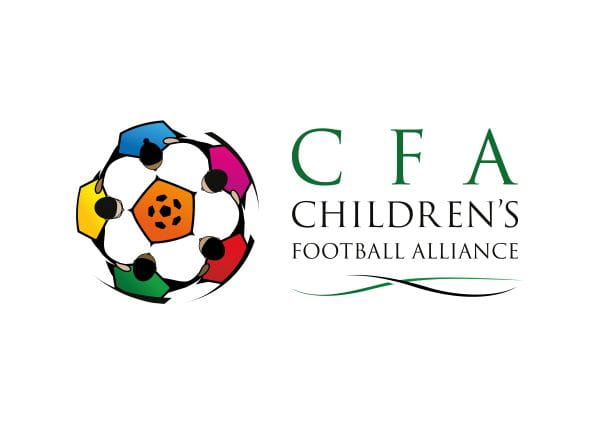
Rasmus Ankersen is an ex-footballer, a bestselling author, a speaker on performance development and a respected advisor to businesses and athletes around the world. You’ll never find him in one place for more than a few days – he is always on the move, flying from city to city to do new research, advise major companies or address sold-out audiences. Well that’s what his website says! NCFA armed Paul Cooper with some crayons and paper to take down the great Dane’s answers to some searching questions fired with love. While trying to track down the globe trotting Rasmus we hasten to add that no-one was hurt during this interview!
Paul Cooper (PC) Thank you for doing this interview for the National Children’s Football Alliance newsletter Rasmus. Where did your incredible journey start?
Rasmus Ankersen (RA).
I had particularly one experience which led me on the high performance track. In 2004 I helped establish Scandinavia’s first football academy. We had to struggle to attract players for the academy’s first intake. Because we were the new boy in business we were the last to pick players and had to take what was left over when the other clubs had made their choices. One of the candidates we considered was a fifteen-year-old boy from a town 50 kilometres from the academy. His name was Simon Kjaer and we only accepted him because we couldn’t get anyone better. However, three years later we ended up selling Simon Kjaer for 3.3 million pounds when he was just eighteen years old. He has since been named at the footballer of the year in Denmark as one of the youngest ever and he is today perceived as one of the biggest football talents in Europe.
The interesting part of this story is that six months after Simon Kjaer had joined the academy all the coaches including me wrote down the names of the five players from the academy we thought would go furthest in five years, in order of priority. At that time we had sixteen players to choose from. Five years later, just after Kjaer was sold for 3.3 million pounds, we reviewed our lists and out of eight coaches no one turned out to have Simon Kjaer’s name on their list. Everyday ever since I’ve obviously asked myself: How could we have been so mistaken? What exactly did we overlook? And my belief is that all coaches, managers, parents and teachers, in any field whatsoever, all have to deal with their own Simon Kjaer problem, because he confronts us all with numerous questions, which need to be addressed regardless of what industry you work in or where in the world you find yourself. What is talent? Do we actually know what the word means? Do we even know what we are looking for? How can we identify talent? How is it grown? And how can we grow it more effectively? It was these questions that drove me to discover the gold mines of talent.
(PC) In the quest to understand high performance you actually lived and trained with some of the best athletes and sportspeople in the world – was there any one experience that stood out for you?
(RA) Visiting MVP Track & Field Club (the world’s most successful sprint club) in Kingston, Jamaica made a big impression on me. We seem to believe groomed fields, top-level technology and comfortable surroundings are necessary prerequisites for success. We would tend to use poor, overcrowded facilities as an excuse for not achieving better results. My experiences in Kingston and in many of the other gold mines I visited really challenged these beliefs. Nowhere I saw these kind of great facilities. First and foremost because people in the gold mines know that luxurious surroundings often diminish effort, because they leave people with a feeling that nobody striving for top performance should ever have: that of already having arrived. A performance environment should not be designed for comfort but for hard work. It has to show people that the road to success is long and uncomfortable. On the bottom line success comes down to mindset and who wants it most – much more than it is about fancy facilities.
(PC) In your new book The Gold Mine Effect you look at the business world as well as sport – can you please tell us a bit about the book?
(RA) No matter if you are a coach in sports or a business leader in business you tend to ask yourself the same questions: How do I attract the best talent? And how do I build an environment where talent flourishes? The general debate on talent development is full of misunderstandings, cliches, romanticised conceptions, guesswork and outdated knowledge. My aim in this book is to deliver a fresh, highly practical perspective on the subject – not by doing the research back from my desk, but actually to learn by literally living and training with the worlds best athletes and their coaches. I believe that my conclusions can be adapted to any field.
(PC) I guess all of the great sports people started their potential careers as children. How important is ‘play’ in achieving high performance?
(RA) Practice is the mother of all world-class performance. When you think you see god-given talent in a business leader, a musician or an athlete, what you really see might is likely to be somebody who consciously or unconsciously practiced a lot in at an early age. At an early stage practice is play. Brazilian boys play in the streets every day and without even realizing it they’ve reached their 10.000 hours of practice when they are 13. A British boy who doesn’t play but just practice at his club three times a week will reach his 10,000 hours of practice when he is in his late twenties. The spontaneous and free play is critical at an early stage not only to get enough practice hours under your skin but also to boost motivation. This is why researchers not only talk about deliberate practice, but also about deliberate play.
(PC) In football children used to learn by playing in the streets, playgrounds and parks – different terrains, formats, ages, abilities and without adult coaches. This has been overtaken in many cases by club systems and at the higher end academies. Is there a danger that this can stifle creativity and children are told what to do rather than finding out for themselves?
‘The biggest mistake we make in Europe is being too well organised’.
(RA) I think there is. Just a look at the Brazilian top players in football. It’s the same story with Pele, Ronaldinho, Robinho, Ronaldo, Zico and all the others grew up in poverty playing on the streets every day. Very little of their training was done in clubs. They practised on their own. The top players we see today in the major international football arenas were not trained in an established system; they are the direct products of unorganised football on the streets. The biggest mistake we make in Europe is being too well organised. Brazilian footballers are not a product of organised talent development. The secret is spontaneous, unorganised football.
(PC) What is the best environment to achieve high performance?
(RA) It’s an environment full of great role models. Look at the running epi center in Iten, Kenya. If you go jogging for 30 minutes as the sun rises, meeting four world champions on the way is not an exceptional event. In Iten the superstars train side-by-side with the young hopefuls. Imagine what that means. Every morning, the novices get to see how the world’s best do their training. They see that elite runners also suffer when the going gets tough; that they are not always at their best either – they see that they are humans too. But they also see what price they are willing to pay and how hard they push themselves. They witness what it takes to success at close quarters.
(PC) Who are your role models and heroes?
(RA) I admire people who have the courage to do the unexpected and leave their comfort zones. People who are driven by inner curiosity and a willingness to learn rather that the need to look good and to maintain a certain image of how other people perceive them.
(PC) How important is the childhood aspect that provides the foundation for world class athletes to develop, focus and remain ultra competitive?
(RA) It’s ultra important. If you want to be really good at what you do you’ll have to start practicing at an early age and you have to understand that very often it is the perseverance that builds the passion, not the other way around. That perseverance will have to be nurtured by a great support system; parents, coaches etc. You will not make international top class if you’re just on your own.
For more information regarding Rasmus Ankersen’s work contact: thegoldmineeffect.com
